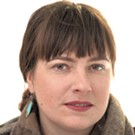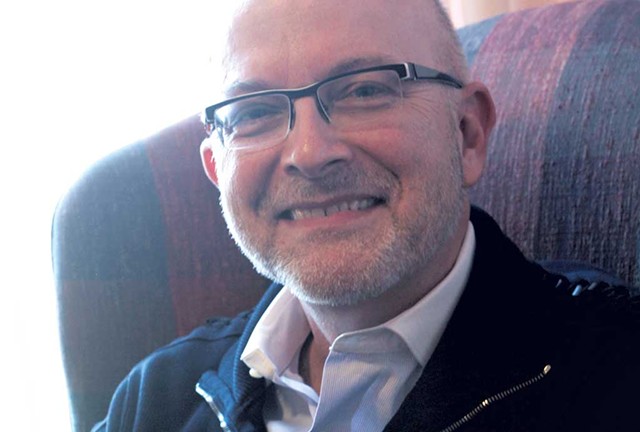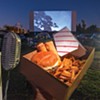Switch to the mobile version of this page.
Vermont's Independent Voice
- News
- Arts+Culture
- Home+Design
- Food
- Cannabis
- Music
- On Screen
- Events
- Jobs
- Obituaries
- Classifieds
- Personals
Browse News
Departments
Browse Arts + Culture
View All
local resources
Browse Food + Drink
View All
Browse Cannabis
View All
-
Culture

'Cannasations' Podcaster Kris Brown Aims to 'Humanize'…
-
True 802

A Burlington Cannabis Shop Plans to Host…
-
Business

Judge Tosses Burlington Cannabiz Owner's Lawsuit
-
Health + Fitness

Vermont's Cannabis Nurse Hotline Answers Health Questions…
-
Business

Waterbury Couple Buy Rare Vermont Cannabis License
Browse Music
View All
Browse On Screen
Browse Events
Browse Classifieds
Browse Personals
-

If you're looking for "I Spys," dating or LTRs, this is your scene.
View Profiles
Special Reports
Pubs+More
7 Questions for Former White House Pastry Chef Bill Yosses
Published November 11, 2015 at 10:00 a.m. | Updated November 11, 2015 at 1:32 p.m.
Last week, scores of teachers, nonprofits, government officials and farmers convened at Sterling College's Craftsbury Common campus for the second annual Northeast Kingdom Farm-to-School Conference. There were workshops on garden-based teaching, locavore lunches, ag-based after-school programming, and ways to fund any and all of the above.
After lunch, Bill Yosses delivered the keynote address. As founder of the New York-based Kitchen Garden Laboratory, Yosses facilitates garden- and kitchen-based programs in underfunded, low-income city schools. If anyone can offer insight on bringing farm-to-school programming to the masses, it's this guy.
But Yosses spent most of his career as a pastry chef. After working under noted chefs Daniel Boulud and Thomas Keller, Yosses ran the dessert programs at New York dining destinations Bouley, Tavern on the Green and Montrachet. Then, in 2006, First Lady Laura Bush hired him to bake in the White House kitchen. His post as executive pastry chef lasted more than seven years.
On Pennsylvania Avenue, Yosses created sweets and treats for the Bush and Obama families, military brass, and visiting dignitaries, guests and celebrities during the White House's annual state dinners.
While working with First Lady Michelle Obama on her Let's Move! childhood obesity initiative, Yosses says he experienced a "sea change" in how he perceived his work. Chefs, he realized, wield great influence on how people eat and relate to food and ingredients.
In 2014, Yosses decided to point his rubber spatula toward a new audience, and the Kitchen Garden Laboratory was born. That work brought him to the Kingdom last week. Before leaving Vermont on Thursday, Yosses took a call with Seven Days. Excerpts of that conversation follow.
SEVEN DAYS: Many Vermonters see our state as a leader in the effort to build an integrated, inclusive food system. What do you see, from the outside looking in?
BILL YOSSES: Vermont is definitely a leader. I think the reason for that is that people are engaged and interested in — and very proud of — where their food comes from, and that's been going on for a long time. It's very much part of the Vermont DNA to be aware of these things, and the quality of the food here is extraordinary.
Organizations like [Green Mountain] Farm-to-School and colleges like [Sterling] and [New England Culinary Institute] and Shelburne Farms are a reflection and an outgrowth of that culture in Vermont, and they've set a high bar. Nobody who's interested in the ethics of food and agriculture can ignore what's happening here.
SD: Many people think of having limited access to fresh food as an urban problem. How does the issue play out in rural America?
BY: It's important for everyone to reestablish a relationship with food literacy. [Regarding urban versus rural], the disconnect is the same. There are food deserts, where people are not exposed to this whole rich world of fruits and vegetables, everywhere. We may imagine that the gap is easier to bridge in Vermont, but if parents work two jobs, getting to see a farm or a garden can be really hard.
SD: What food-forward favors can we do for our kids in the home?
BY: Cook with them — and, yes, that includes learning how to use a knife and not cut yourself. It's a fun time, but it's a fun serious time. I use the world "mindfulness" to remind kids that we're doing something with sharp and hot objects, and that it takes focus and attention to make sure something comes out right. But they like that. It's like learning a sport, and they take to it. It's the best way to introduce [kids] to this process, and it changes the dynamic. Schedules are often dictated by parents, and one of the ways children rebel is with food preferences. They learn, Oh, I can have preferences, and I can define myself by saying I don't like that, or I don't like this. A kid can say, "I'm my own person; I don't like carrots," but when they're involved in growing and cooking carrots, they can make it their own.
SD: What's one telling experience you've had in the kitchen or garden with kids?
BY: Kids love [compost] because in certain parts of the cycle there's a lot of worms and squiggly bugs. They like being grossed out by that. Also, the compost finishes the story for them. Kids see this as a complete story with chapters. We talk about a seed, and a plant, and what is photosynthesis, and how does sunlight become energy through this process; about pollination and this world of honeybees and other pollinators and how they've evolved over eons to complement plant life on Earth. We show them a tomato flower and this tiny green dot on the end. That's a tomato that has not been fertilized.
At a point, it's like, OK, we understand that we eat the fruits and vegetables, but what happens to the rest? That story is about those nutrients returning to the soil through the composting method. That's the end of the fairy tale, where all those good things go back to the earth and it all begins again.
SD: What was a highlight of working at the White House?
BY: Mrs. Obama invited school kids from around the country to come and plant the garden. We brought the same kids back a few months later. We harvested and washed the vegetables and cooked and ate at picnic tables with Mrs. Obama. During both planting and harvesting — you can't help but be hopeful for the future when you see this and the way those kids reacted. With all that's going on in the world, if that moment can happen, there really is some hope for the human race.
SD: Any key lessons learned while cooking for the Obama and Bush families?
BY: Oddly enough, they're very similar. They both like good food, and they like very homey American food. One of the occupational hazards of the presidency is having extremely rich food pushed at you all the time. Everyone wants to impress — and usually it's with the most rich and caloric dish. So both families asked for simply prepared, tasty and nutritious foods made with great ingredients. There was not a lot of build up or frou frou — everything was very pared down. As a cook, I learned a lot about the nobility of great, simple food cooked in a healthy manner. With dessert, I'm perfectly willing to accept that there may be nothing such as a healthy dessert. But there will be a relationship to a healthy lifestyle that includes dessert. Give me butter and lard and heavy cream, but make it cream from an artisanal dairy and eggs from a great hen who can eat when it wants to eat. Use whole grains, and grains other than wheat. In that case, you don't need much of it, because your palate realizes how full of nutrients these things are.
SD: Anything else you'd like to add?
BY: No question about the gingerbread White House? We would build this huge gingerbread house every holiday season — it was, like, 400 pounds — and every year we'd try to outdo the last. One year we opened up the rooms like a dollhouse and remade the [furniture] with chocolate and marzipan. That just drove the stress quotient through the roof. The [White House] carpenters got involved and helped us fashion this fountain in front of the gingerbread house. The electricians had to come up with special lighting, and the engineers helped, too. All of the house staff departments got involved, and it became this kind of team-building effort throughout the house. The resident staff of the White House are these unsung heroes who are extremely devoted to the president and to the presidency itself. They're very discreet — you never hear them gossiping, and they hear plenty. I always like to take a moment to give them credit.
The original print version of this article was headlined "Seven Questions for Bill Yosses"
Related Locations
-
NECI on Main
- 118 Main St., Montpelier Barre/Montpelier VT 05602
- 44.26099;-72.57517
-
 802-223-3188
802-223-3188
- www.neci.edu/our-restaurants.php
-
Shelburne Farms
- 1611 Harbor Rd., Shelburne Chittenden County VT 05482
- 44.39568;-73.24739
-
 802-985-8686
802-985-8686
- www.shelburnefarms.org
-
Sterling College
- 16 Sterling Drive, Craftsbury Common Northeast Kingdom VT
- 44.65223;-72.38276
-
Be the first to review this location!
Got something to say?
Send a letter to the editor
and we'll publish your feedback in print!
Tags: Food + Drink Features, pastry chef, White House, composting, Sterling College, NECI on Main, Shelburne Farms
More By This Author
About The Author

Hannah Palmer Egan
Bio:
Hannah Palmer Egan was a food and drink writer at Seven Days.
Hannah Palmer Egan was a food and drink writer at Seven Days.
Speaking of...
-

Shelburne: What to See, Do and Eat During the Eclipse
Feb 6, 2024 -

Video Guide: Things to Do in Vermont During the Eclipse
Jan 25, 2024 -

Sterling College’s New President Is Confident in Tiny School’s Enduring Appeal
Dec 13, 2023 -

Best Vermont cheese brand
Aug 2, 2023 -

Best outdoor music venue
Aug 2, 2023 - More »
Comments
Comments are closed.
From 2014-2020, Seven Days allowed readers to comment on all stories posted on our website. While we've appreciated the suggestions and insights, right now Seven Days is prioritizing our core mission — producing high-quality, responsible local journalism — over moderating online debates between readers.
To criticize, correct or praise our reporting, please send us a letter to the editor or send us a tip. We’ll check it out and report the results.
Online comments may return when we have better tech tools for managing them. Thanks for reading.
- 1. La Montañuela and D’Aversa Furniture to Open Wine Bar-Showroom in Vergennes Food News
- 2. Three Questions for Kate Blofson of Jericho’s Born to Swarm Apiaries Agriculture
- 3. New Sheep Shop Café on a South Woodbury Homestead Gathers the Herd Food + Drink Features
- 4. The Café HOT. in Burlington Adds Late-Night Menu Food News
- 5. After 33 Years, Cheese & Wine Traders in South Burlington Shutters Abruptly Food News
- 6. Pauline's Café Closes in South Burlington After Almost Half a Century Food News
- 7. Montréal's Jewish Eateries Serve Classics From Around the World Québec Guide
- 1. Montréal's Jewish Eateries Serve Classics From Around the World Québec Guide
- 2. Pauline's Café Closes in South Burlington After Almost Half a Century Food News
- 3. After 33 Years, Cheese & Wine Traders in South Burlington Shutters Abruptly Food News
- 4. Jacob Holzberg-Pill Helps Cultivate Vermont’s Growing Appetite for Edible Landscaping Agriculture
- 5. Small Pleasures: Monument Farms Dairy’s Chocolate Milk Inspires Devotion Small Pleasures
- 6. Ondis Serves Seasonal Fare With a Side of Community in Montpelier Food + Drink Features
- 7. New Sheep Shop Café on a South Woodbury Homestead Gathers the Herd Food + Drink Features








































